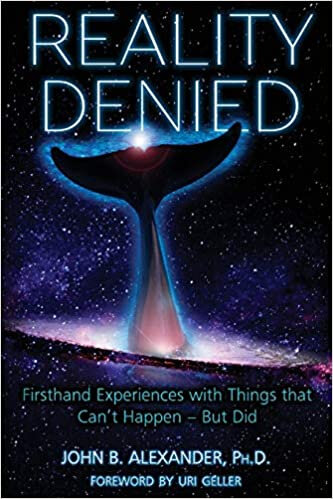My stomach hurt when you pulled the "science says"* card on him when he was talking about how the universe is conscious and humans evolved from it. I thought your comments were out of character. I am disappointed because Dr. Alexander was civil the entire time and didn't deserve that.
It sounds above like you're imply that deferring to science is in some way uncivil unless someone walks on eggshells to be sure they don't hurt anyone's feelings. Let's not forget that Alexander was a Colonel in the armed forces. I'm sure his hide is plenty thick enough. So perhaps it's yours that was affected more than his, and if so, please understand that if it was you or I having the same discussion, it may have gone entirely differently.
I guess you have baggage with him and made it personal.
I didn't make it personal. Making it personal would be something like calling Alexander stupid, or calling him names. Or attempting to embarrass him. Invoking science isn't personal. It's exactly the opposite. Ideas are fair game, and science is a critical piece of equipment in determining the outcome. How far would you have us dull it down just to make others happy?
You simply could have phrased it by saying, "that goes against everything we've learned in school" and let him continue since he's the guest, instead of accusing him of not believing in evolution.
Again, why the eggshells? I don't use foul language, epithets, or personal attacks. Should that not be good enough? Since when did "science" become a dirty word anyway?
It's not like what Dr. Alexander said is something you never heard before, and Gene didn't have a problem with the suggestion that a super consciousness may be the key to the paranormal. Please do not get offended, because I am a fan of the show, but I didn't feel that you contributed to the conversation and the comments were unprofessional, considering other guests have said things that go against common sense and you just listen. ?
I appreciate that you are trying to relay a concern rather than intending to offend. One thing that you might appreciate is that I have made a concerted effort to put into practice some of the principles of emotional intelligence, that prior to reading-up on it, I had thought should be unnecessary, because after all, why should anyone get upset with each other when simply exploring a subject together in an objective manner?
Max Planck said, "All matter originates and exists only by virtue of a force which brings the particle of an atom to vibration and holds this most minute solar system of the atom together. We must assume behind this force the existence of a conscious and intelligent mind. This mind is the matrix of all matter."
Max Planck may have made such a statement, but that doesn't mean it's true. Specifically, it's a logical fallacy to assign a cause to an effect when the hypothetical cause cannot be shown to contribute directly to the effect. It also helps to see if there are any other similar positions that we can learn from, and when we do so, we find a philosophy called
subjective idealism.
We could delve a little deeper into both of those situations to reveal a number of weaknesses, however at present it doesn't appear to be possible to disprove subjective idealism. But let's not forget that not being able to disprove a hypothesis doesn't mean it's automatically been proven true either, and that generally speaking, valid science also requires a hypothesis to be
falsifiable. Is Planck"s hypothesis
falsifiable?
Lastly. Something else Max Planck said was: "Miracles must yield, step by step, before the steady and firm advance of the facts of science, and its total defeat is undoubtedly a matter of time." Personally, I'm not so sure that everything can be solved by science, whether they're miracles or not, but it does go to show that anyone can use authoritative sounding one-liners to advance an agenda. That is a telltale sign of
persuasion rather than
explanation.


 John B. Alexander, Ph.D. is a retired senior Army officer with nearly half a century experience in special operations, intelligence, and research and development. A Green Beret combat commander in Vietnam, he later advised senior Ministry of Defence officials in Afghanistan.
John B. Alexander, Ph.D. is a retired senior Army officer with nearly half a century experience in special operations, intelligence, and research and development. A Green Beret combat commander in Vietnam, he later advised senior Ministry of Defence officials in Afghanistan. 

 .
.